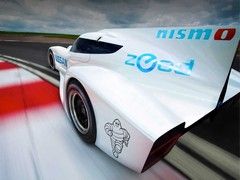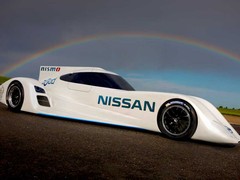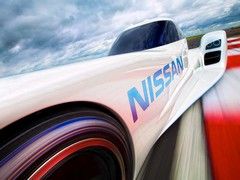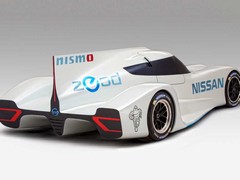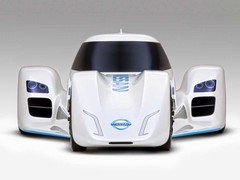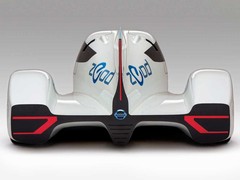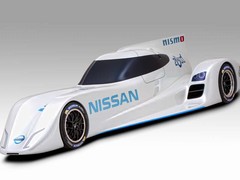Nissan ZEOD
Nissan reveals electric racer for Le Mans 2014 - just don't call it DeltaWing II, OK?
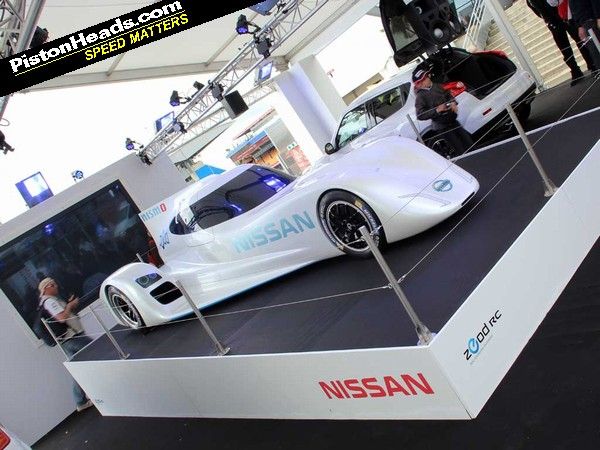
The DeltaWing's designer Ben Bowlby may be involved but with the original company behind it now following its own path Stateside and in possession of many of the patents following the split from Nissan this all-new racer is the ZEOD RC. And the D-word is off limits. "They wanted to build racing cars, we wanted to use it as a technologly test bed," shrugs Cox.
If the intellectual property lies with DeltaWing Racing in the States the emotional property is something Nissan quietly holds a claim to, having put its name to Bowlby's radical design and entered it in last year's Le Mans. And it's at Le Mans where the ZEOD RC is being revealed in public for the first time in Nissan's FanZone as part of the brand's 'fans first' philosophy. This rides on the back of huge popular support for the wild-looking DeltaWing, despite it sadly being knocked out of the race even after frantic efforts by the team to keep it running.
ZEOD stands for Zero Emissions On Demand and in case you hadn't already guessed the new car will be able to run purely on electric power at speeds of up to 186mph. Even Nissan's experience of electric cars hasn't figured out a way of doing this for 24 hours yet so there will still be some form of internal combustion engine involved too, be it as a range extender or full hybrid drive. Nissan isn't saying yet but Cox says the powerplant will be "radical" and not necessarily the highly developed 1.6-litre Juke engine that was in the DeltaWing. Indeed, everything on the car from the tub up is brand new with just the concept carried over into the ZEOD age.
"The ZEOD RC programme is designed to develop multiple technologies to evaluate how they could be used for a future LMP1 class return of Nissan at the Le Mans 24-hour," says Nissan's Andy Palmer. "There are multiple options we are investigating. A Zero Emission on Demand option where the driver can switch between electric and petrol-powered drive is a future direction for road cars, so that will be tested in addition to pure electric power and other new technologies that we still have under development."
That programme starts with a Garage 56 place for 2014 for experimental cars but, as above, it's Nissan's stated aim that the ZEOD should spawn a 'proper' LMP1 car.
And with Bowlby on board - he's now officially Nissan's Director of Motorsport Innovation - it's no surprise to see a return for the 'narrow track' configuration for the ZEOD RC. As Cox puts it, Bowlby is an aerodynamics and packaging man rather than drivetrain focused, his innovative and free-thinking approach finding a perfect partner with Nissan's established electric experience both in road cars like the Leaf and the NISMO Leaf RC experimental racing car.
"Developing a car like this provides an incredibly challenging test bed for what could be highly-effective options for road cars of the future. Throughout the next 12 months we will be testing multiple drive train options in an extensive test program," says Bowlby in an official Nissan press release. "We have many options to consider and test. The test program is part of a longer term goal of developing a system and a set of rules for this type of technology in partnership with the ACO that would be best suited to competing at the highest level of this sport. A large part of our work in the coming months is to discuss with the ACO future opportunities for the 'electrification' of the Le Mans rules in the future and work towards delivering appropriate technology. Garage 56 is a bold move by the ACO to showcase Innovation and allow testing of untried components and systems for future competition use. To this end they are the most forward thinking promoter in Motorsport today."
With two thirds of the LMP2 grid at this year's Le Mans Nissan-powered the firm clearly has designs on continuing this quiet domination of endurance racer drivetrains onwards into the electric era. OK, so 'DeltaWing' as a brand continues on a different path. But as a concept Nissan is sticking by it and with Bowlby at the heart of it you can think of it as the start of a new age, not the premature end. Like Formula E advocate Lord Drayson, who we met recently, it'll put British engineers at the heart of the electric revolution too. Which can only be a good thing.
Oh, and the blue lights? Those parts of the car will be illuminated by LEDs when the car is running on purely electric power. Which'll look pretty cool half way down the Mulsanne at 186mph.
Like:
Let's be honest, Nissan knows everything there is to know already about making a successful road car, whatever the propulsive medium. A racing program is too narrow and specific to help develop road car technology, where Cost, Manufacturability, Design for Build, and even recyclability now drive the process almost entirely.
Take the "low aero drag" of this race car. Great, but it is a result of the cars form factor, not detail design, and that form factor is not a practical road car form factor, so you can't use it. See the issue? Road car aero improvements come from detail design of a form factor that is actually extemely limited in it's scope (if you want to package 4 humans and their dog, then a cube is a good place to start). And i'm going to guess that Nissan spends several hundred times as much money in their windtunnel/CFD suite doing the aero for the next Micra than this race car ever sees.
The simple fact of the matter (from a cost/benefit standpoint), is that electric powertrains, no matter what their architectural layout, still require something like a 100% improvement in energy storage technology to occur before it becomes a viable tech for road cars.
So, i welcome Nissan back to a unique race program, and hope they do well and go fast, but lets not get distracted and let those pesky marketing bods wrap all this up in the normal "racing improves the breed" mumbojumbo ;-)
And finally, on the subject of hybrids(series or parallel), I should point out that there is a fundamental disconnect between how hybrids actually leverage increased efficiency and the operating point for a racing car! (hint: which two throttle settings are used most on a race car)
Like:
Let's be honest, Nissan knows everything there is to know already about making a successful road car, whatever the propulsive medium. A racing program is too narrow and specific to help develop road car technology, where Cost, Manufacturability, Design for Build, and even recyclability now drive the process almost entirely.
Take the "low aero drag" of this race car. Great, but it is a result of the cars form factor, not detail design, and that form factor is not a practical road car form factor, so you can't use it. See the issue? Road car aero improvements come from detail design of a form factor that is actually extemely limited in it's scope (if you want to package 4 humans and their dog, then a cube is a good place to start). And i'm going to guess that Nissan spends several hundred times as much money in their windtunnel/CFD suite doing the aero for the next Micra than this race car ever sees.
The simple fact of the matter (from a cost/benefit standpoint), is that electric powertrains, no matter what their architectural layout, still require something like a 100% improvement in energy storage technology to occur before it becomes a viable tech for road cars.
So, i welcome Nissan back to a unique race program, and hope they do well and go fast, but lets not get distracted and let those pesky marketing bods wrap all this up in the normal "racing improves the breed" mumbojumbo ;-)
And finally, on the subject of hybrids(series or parallel), I should point out that there is a fundamental disconnect between how hybrids actually leverage increased efficiency and the operating point for a racing car! (hint: which two throttle settings are used most on a race car)
P4ROT

(PS You've got to love the old German compound nouns!)
"It's risky", said experience.
"It's pointless", said reason.
"Give it a try", said the heart.
"What the hell was that?", said the anus 1 minute later.
P4ROT

(PS You've got to love the old German compound nouns!)
In the particular case of the racing transmission technology, what enabled it to move into road car usage was not actually anything to do with transmissions! (in fact, it was the relentless cost reductions realised in automotive electronics and controls, that pretty much came from the consumer electronics market (mobile phones, laptops etc and directly from fab-less silicon developers such as ARM etc))
So, what we have to ask is "does an electric racing car push forward battery technology"?
Well, in a loose sense, yes, it probably does, but only by injecting more money into the system. The battery suppliers are already trying everything they know to improve the energy storage and total charge transfer capabilities of battery systems. Not just in automotive, but in every sector.
On the other hand, if we just wanted to develop the best batteries, why would we waste a million pounds making the test rig look like, and be, a race car? You can test battery systems to the limit with a load bank and a charger, and the £960k saving could be spent on the development program to much better effect.
Then we get to the real killer point. If you spent lots of money developing a race car, what you get at the end of the program is, funnily enough, a race car. Now my next door neighbour has a current nissan, but i don't think she'd find swapping her Micra for a ZEOD to be an effective swap. Road cars just aren't driven like race cars.
In effect, for successful race car the list of important to not-important goes (something)like this:
IMPORTANT
1) maximum performance
2) lowest mass
3) smallest package
4) durability
5) Design for manufacture
6) Cost
7) Reliable materials source
8) Type approval / regulations
9) Re-cyclability
NOT IMPORTANT
I'll leave it up to the reader to re-order that list for a road car, but i'd hazard a guess it really wouldn't be far off a compete reversal of the hierarchy!
We are not stupid, we know all this "R&D for future road cars" is guff but its their money, let them spend it on what they like.
I for one am glad to see innovation being raced at LM's, despite the negativity put about by some you do learn a thing or two when you try and make a machine work 100% flat out for 24hrs, even if the only thing that ends up in road cars is a new connector that it cheaper/lighter and comes loose less easily then at the budget levels of road cars its worth while.
The ZEOD looks awesome though, like a racing Concord! :-) I like the tricycle look with the front narrow track, I'm sure I had a HotRod that looked like that!
And that really was my point.
If we want a better road car charging connector for example (which actually has already been designed/standardised for road cars you should note) then we should design exactly that, and not develop one for a race car instead!
Can't quite believe you are criticising Nissan for going motor racing.
Will pistonheads adopt the phrase "Nissan Matters"? I'm a bit sad, however, that we're never going to see any developments from any manufacturer now that Nissan has mastered building road cars.
As Toyota understood very early on, it is one thing to design and build a series production car with a novel powertrain (quite an undertaking in its own right) but quite another to then sell, maintain, and eventually dispose of that product in the open market without incurring a huge cost penalty or critically damaging your companies quality reputation.
As of today, if you want an electric powetrain for your race car it is actually very simple and relatively cheap to get one. Off-the-shelf battery systems, inverters and motors are all available at various power levels from lots of companies that will power your race car along perfectly. Numerous open architecture control systems are also available (Dspace/ETAS etc etc) to help you to integrate those components, and model based autocoded control algorithms are easy to develop for a one off application (Simulink/Targetlink etc)
But, there is no such thing for a production electric traction system. Take a close look at a Prius, or an Ampera/Volt for example. It takes just 5 sec to spot the numerous application specific components and systems that have had to be developed to meet the rigorous legislative and quality/safety criteria that are necessarily in place for mass market road cars.
Then you get to the thorny issues of things like battery durability. A race car might help you to determine say the total charge transfer wear of a particular battery system (although as i said earlier, a simple cheap rig would do that for a lot less money) but it does not answer the difficult question of "how do my customers actually use this car, and what battery durability does that give in the field over say a 15 year period"?
Toyota realised this early on, and what the Prius has done is provide them with a wealth of real world data on how their cars are actually used, which is worth far far more than any specific battery system capability data. Newer cars like the Ampera/Volt are fitted with remote telematics, that are sending the useage and operating parameters of their customer cars constantly back to GM's data centre for assembling into critically useful operating parameter information.
So, sure Nissan, go racing, enjoy it, have fun, develop a unique car, but lets not get carried away in our own hyperbole shall we ;-)
P4ROT

(PS You've got to love the old German compound nouns!)
In the particular case of the racing transmission technology, what enabled it to move into road car usage was not actually anything to do with transmissions! (in fact, it was the relentless cost reductions realised in automotive electronics and controls, that pretty much came from the consumer electronics market (mobile phones, laptops etc and directly from fab-less silicon developers such as ARM etc))
So, what we have to ask is "does an electric racing car push forward battery technology"?
Well, in a loose sense, yes, it probably does, but only by injecting more money into the system. The battery suppliers are already trying everything they know to improve the energy storage and total charge transfer capabilities of battery systems. Not just in automotive, but in every sector.
On the other hand, if we just wanted to develop the best batteries, why would we waste a million pounds making the test rig look like, and be, a race car? You can test battery systems to the limit with a load bank and a charger, and the £960k saving could be spent on the development program to much better effect.
Then we get to the real killer point. If you spent lots of money developing a race car, what you get at the end of the program is, funnily enough, a race car. Now my next door neighbour has a current nissan, but i don't think she'd find swapping her Micra for a ZEOD to be an effective swap. Road cars just aren't driven like race cars.
In effect, for successful race car the list of important to not-important goes (something)like this:
IMPORTANT
1) maximum performance
2) lowest mass
3) smallest package
4) durability
5) Design for manufacture
6) Cost
7) Reliable materials source
8) Type approval / regulations
9) Re-cyclability
NOT IMPORTANT
I'll leave it up to the reader to re-order that list for a road car, but i'd hazard a guess it really wouldn't be far off a compete reversal of the hierarchy!
You're so right about R&D budgets though; I imagine relative to racing budgets the difference is ridiculous compared to the 1980s!
(BTW I'm trying to imagine your neighbour -a little old lady in my mind- driving a ZEOD...lol)
Gassing Station | General Gassing | Top of Page | What's New | My Stuff

